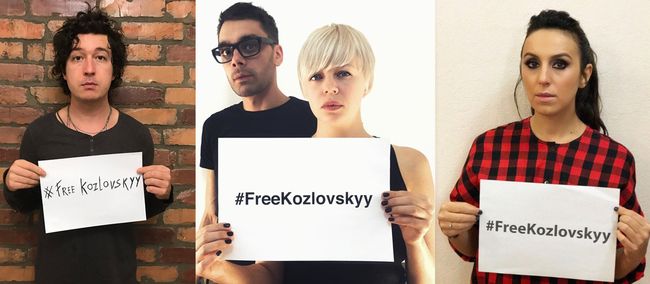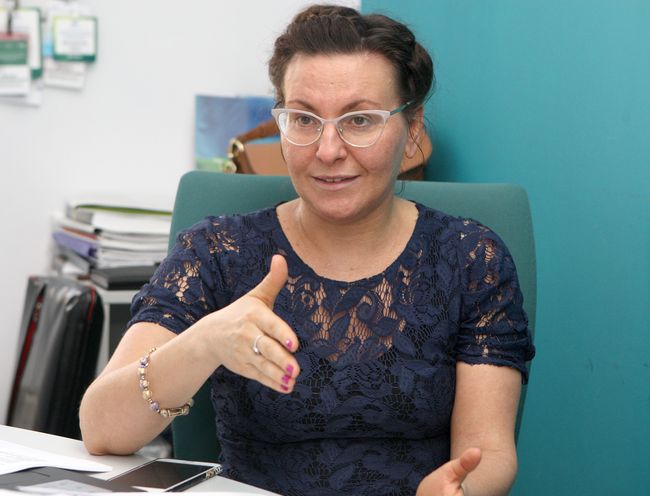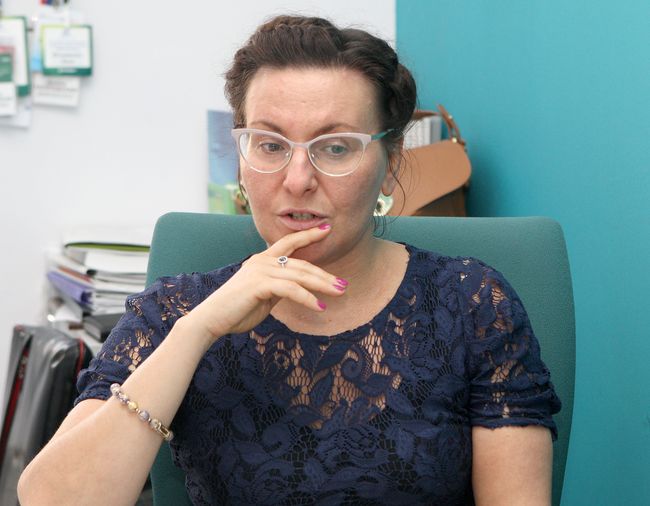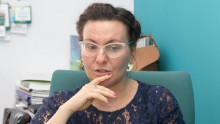Dr. Serhii Hrushevsky, history lecturer with the Donetsk Institute of Public Education [sic], was shot by an NKVD firing squad in Sandarmokh, a ravine in Karelia, in November 1937. He was one of a number of Ukrainian scholars to fall prey to Stalin’s purges at the time. Eighty years later, the self-styled Donetsk People’s Republic, aided by the Kremlin, came up with an icon of Joseph Stalin, with billboards bearing his image installed across the city. Even worse, so, the DNR authorities decided to apply Stalin’s methods against the dissenters, especially in the scholarly domain.
In January 2016, Ihor Kozlovskyi, a resident of Donetsk, a philosopher who specialized in religious studies, was arrested by DNR militants. The man made no secret of his pro-Ukrainian stand and stayed in Russia-controlled Donetsk because he had to look after his Down-syndrome-afflicted, half-paralyzed son Sviatoslav. He was arrested on charges of illegal weapons possession. Followed appeals from international organizations, noted scholars and artists, flash mobs and #FreeKozlovskyi hashtag. The DNR authorities insisted that he was a citizen of a fake republic. In May 2017, Kozlovskyi was tried by court-martial in Donetsk and sentenced to two years and eight months. He is serving the term at the Corrective Labor Colony of Horlivka.
The entire situation is horribly absurd! A man whose worldview is based upon peace and mutual respect finds himself listed by the militants as a “security risk.” Ihor Kozlovskyi has a range of interests. He is an author of hundreds of research papers; his name is known far outside Ukraine. His legal case is in a state best described as stagnation, so Den/The Day tried to help, interviewing his niece Diana KOZLOVSKA, a licensed lawyer, asking her to clarify the situation. Ms. Kozlovska chose her words carefully, but one could tell that she held her uncle in high esteem.
INFORMATION CAMPAIGN DIDN’T HELP MUCH
How do you keep in touch with Mr. Kozlovskyi after his so-called DNR court martial? What is his current status?
“Ihor Kozlovskyi has been allowed two visits by family members. We were not allowed. We are barred entry there, considering our family name. Status? What status can a prisoner have? Less than satisfactory, but Ihor Kozlovskyi is trying to keep in shape. He realizes that has to live through this. He is a man of strong will and has kept up a healthy life style. This should help him under the circumstances. The corrective labor colony was built in Horlivka during Soviet times. It is a set of barracks in a field [behind barbed wire] where [ATO] gunfire is clearly heard.

Editor’s note: Rallies in support of Ihor Kozlovskyi united a number of his students, colleagues, and media people. Dmytro Shurov, Yevhen Filatov, Nata Zhyzhchenko (Onuka), Jamala, and other pop stars took part in the Free-Ihor-Kozlovskyi flash mob (March 2017)
“The information campaign didn’t help much, save that it reminded Ukrainian society of all those people who remain in the occupied territories, taken prisoners of war, who have to be liberated. The local so-called judiciary authorities are fake, playing their games. Considering that their official status is not recognized internationally, none of their rulings can be regarded as legally valid. All attempts to resolve the Ihor Kozlovskyi legal case by the Ukrainian side have failed. His name is on our POW exchange list, but I don’t think that it is on that of the LNR/DNR. They have long insisted that he is a citizen of the so-called DNR, but no documented proof has been provided, so this is apparently another attempt to tamper with our POW exchange lists.”
Did you work out a strategy after Mr. Kozlovskyi’s court martial in Donetsk?
“What they call legislative acts and what they believe to be legally effective in the ‘Separate Districts of Donetsk and Luhansk Regions’ are actually part of the Code of Criminal Procedure adopted by the Ukrainian Soviet Socialist Republic in 1960. Under this code, a convict can be granted parole after serving three months. Mr. Kozlovskyi spent three months in the remand prison of the so-called Ministry of State Security, so this term should be considered [by the parole board]. Also, he should be allowed to address the chief warden and apply for a letter of reference, and for parole. All this strongly reminds one of what was happening back in 1937. In fact, we see all this happening.”
NOTHING BUT PERSONAL...
What do you think could have motivated the other side?
“I m not sure, but I think I know what could have motivated the other side: Vladimir Putin’s inner circle, people in charge of POW exchanges. They’re holding them as trump cards up their sleeve, as a leverage during the Minsk and Normandy format talks; also, as hostages in the game against the US and its sanctions enforced on Russia. I believe that there are only so many persons within Mr. Putin’s inner circle who can influence the POW exchange process.”

Why do you think the DNR refuses to make any concessions in the Kozlovskyi case?
“Once again, I’m not sure, but I think the whole affair is very personal. Ihor Kozlovskyi stayed in Donetsk when none of those who had stated their Ukrainian stand in the spring of 2014 remained. After Ukraine had lost control over Donetsk, he stayed there and lived like an ordinary pensioner, looking after his son. He didn’t try to hide, everyone knew where he lived. Then there was the case with the monument to Vladimir Lenin. On January 27, 2016, a group of unidentified individuals blew up the monument’s foundation and Ihor Kozlovskyi was arrested shortly afterward. There was a witch-hunt aimed against all but Moscow-Patriarchate-controlled confessions, so I guess he just happened to be at the wrong place, at the wrong time.”
NO CHANCE OF RELEASE DEAL
After Ihor Kozlovskyi’s arrest his relatives took their time making the fact public knowledge. Why? Did they do so after realizing that this was the best option?
“They took their time because they believed that keeping quiet would help release him from prison. I know of cases when militants seized people and their release could be negotiated, there and then. Ihor Kozlovskyi was a public person, the news of his arrest quickly spread across the social networks, there was no way to control the situation. As time passed, we saw that nothing was happening. We had used all our resources and were then led to understand that there would be no deal concerning Ihor’s release. In fact, we didn’t know his whereabouts for a month. Then we received what was termed as official information from Donetsk and realized that we had to make the whole thing public knowledge to save the man’s life. I can’t complain about the Ukrainian authorities. They did their best, entering his name into the POW exchange lists, and so on.”
ARISTOCRATIC BACKGROUND AND RECOGNITION
I’ve read about Ihor Kozlovskyi as a member of an aristocratic Cossack family, about his effort to restore the Cossack tradition, about him being the first at the head of Cossack Union of Donetsk Oblast. Any comment?
“Sorry, I have practically no such information. He used to tell us something, now and then, but I simply wasn’t interested. I remember him saying that his family is an aristocratic Cossack one, that some men were at the Zaporozhian Sich and took part in campaigns against Turkey, but I can’t offer any details. I know that Ihor Kozlovskyi studied the Cossack topic for a number of years, that he was one of those who tried to revive the Cossack tradition in Donetsk oblast, starting in the late 1980s. They even organized a Ukrainian Registered Cossack Society. He was number two there, in charge of religious affairs. I guess this would be interesting to discuss in an interview with Ihor Kozlovskyi.”
How did he come to take a major position in the Noble Titles of Portugal?
“He was conferred the Order of St. Theotonius in Portugal, from what I can recall, in recognition of his meritorious humanitarian and scholarly activities. He also has awards from the United States, Japan, and other countries.”
He is also an honorary citizen of the State of Oklahoma, isn’t he?
“He read lectures at several universities, including the ones of Pepperdine and Harding. Those were public lectures and he was invited by various Christian communities. One of their leaders is currently the senator of Oklahoma.”
HE ARGUED THAT PEOPLE ARE PEACEABLE
Mr. Kozlovskyi is the author of more than 50 scholarly books. Would you formulate their leitmotif?
“I guess his main message is making people realize that there is only one God, despite the variety of confessions and religions, and that this God is in your heart. He believes that religious tolerance is very important. There are different religions and religious views. Each adherent has the right to profess his religion, but only if he does so without hurting any other adherent’s feelings. He says that all religions are peaceful, although each has its peculiarities. He has long been studying Ayurveda (a system of medicine with historical roots in the Indian subcontinent) and some of his books are dedicated to the subject. He has also studied other religions, also Sufism and the Assyrian Church. Some of his papers deal with the Jewish ethnic community in Donetsk oblast – and they hold the author in esteem. The same is true of the Muslim, Buddhist, and other communities. He also has a book of verse and cookbooks. The range of his interest is amazing.”

What was his impact on you personally?
“He was like another daddy. There were things I simply couldn’t tell my parents. They’d be too worried, but there was this man I could confide into absolutely. He was my spiritual father and he made quite an impact on my family. It’s thanks to him that we all are into yoga, that we try to see every individual for what s/he is.”
OTHER INMATES LEFT “OFFSCREEN”
Does your family need any help, especially Ihor Kozlovskyi’s son Sviatoslav?
“We’re managing and there are people who need help more than we do. Until now, Ihor Kozlovskyi was Sviatoslav’s only legal custodian, but now the Ukrainian government can’t pay Sviatoslav the money due him as a handicapped person from birth, because Ihor Kozlovskyi is in no position to do the required paperwork. The family has collected the papers and filed a second custodian claim. It is being processed and I hope for the best.”
What about our prisoners of war, especially civilians, held in the east of Ukraine? Do you think our authorities are doing their job, considering that some human rights activists say Ukraine lacks an adequate strategy?
“There is no adequate strategy. Perhaps because those responsible believe that they have more important things to consider. On the other hand, Ukraine has never been in a situation like this one, I mean the war. No one was prepared for it. Ukraine isn’t like Israel. We have a different mentality, unlike theirs that took shape over the years of its existence. We all know about Corporal Gilad Shalit who was released in return for 1,027 terrorists released from Israeli prison. Well, I could be wrong comparing Ukraine to Israel in this context, considering that in Israel all decisions are made as resolved by society, where the government reflects what the man in the street thinks. Also, one has to consider that Israel has been in a state of war for the past 70 years. Ukraine was anything but prepared for war. Hopefully, this country will learn from another country’s hard-earned and blood-covered experience.
“What should be done? I think some people should be put in positions to best deal with this particular problem. Right now, this problem is being handled along with lots of other problems, including social assistance. I think the current administration should keep our POWs in mind. For starters, in the first place, keep their names in the public eye, help their release and help their families in every way. Parents trying to get their son free stand a slim chance of doing so while being faced with all kinds of domestic, mostly red-tape problems.
“In our case, the man has been a public figure for a very long time, hence the publicity. There are other inmates serving between 8 and 20 years. I think that they are left “off-screen” – perhaps because those ‘upstairs’ don’t think that they are as important. This policy dates back to the good old Soviet times. We must pay more attention to the political prisoners and make every effort to help their families – at least, on the Ukraine-controlled territories.”







